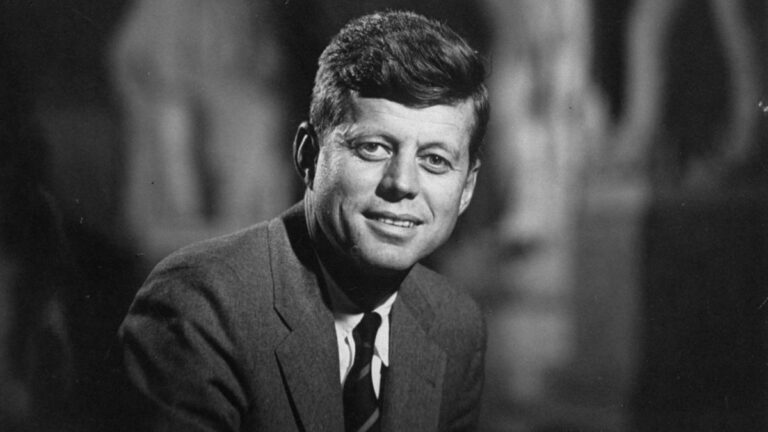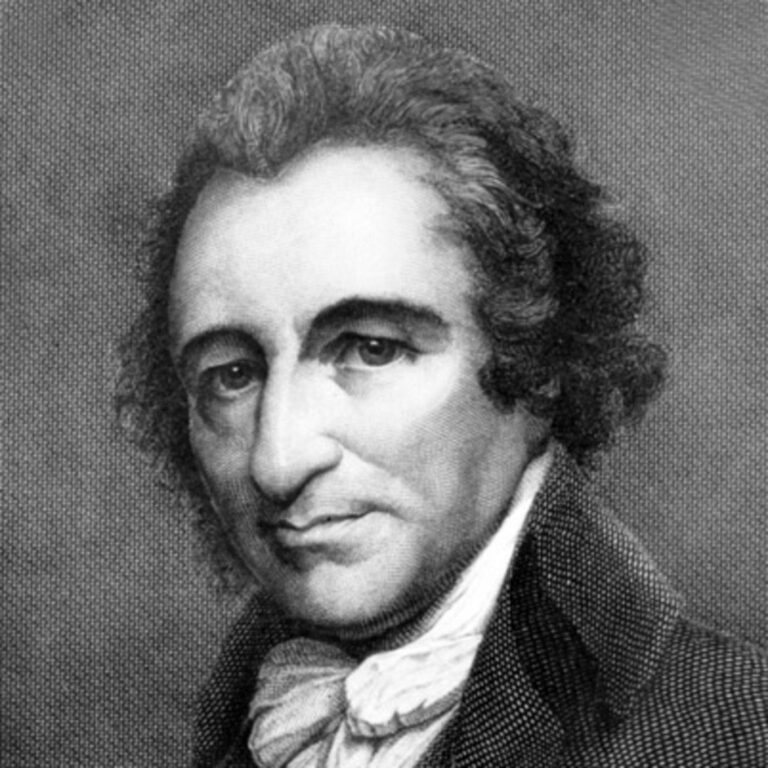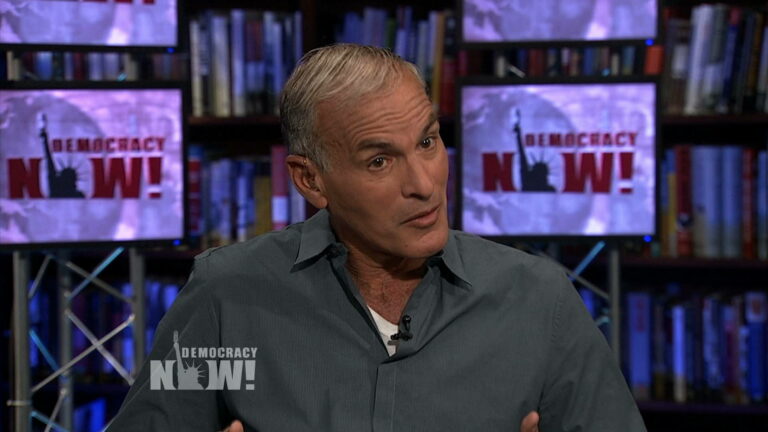This interview was originally published on January 9, 2014. Chris Hedges and NSA whistle-blower William Binney tell Paul Jay that there should be accountability, including the President himself, for the criminal practices used by the NSA against the American people.
PAUL JAY, SENIOR EDITOR, TRNN: Welcome back to The Real News Network. I’m Paul Jay in Baltimore. And this is Reality Asserts Itself.
In the next few days, President Obama is apparently going to announce new regulations, perhaps limiting the way the NSA collects everybody’s phone records.
Now joining us to talk about what they think President Obama should be saying are two men that have been in the midst of this debate.
First of all, joining us in the studio is Chris Hedges. He’s a Pulitzer Prize-winning journalist, a senior fellow at the Nation Institute, and author of many best-selling books, including Days of Destruction, Days of Revolt. And he writes a regular column for Truthdig.
And also joining us is William Binney. He was the former technical director of the World Geopolitical and Military Analysis Reporting Group and a senior NSA cryptomathematician (boy, I’ve got a lot of words to say to introduce you, William; Cryptomathematician–I like saying that; I’ve got to say that a few times) at the NSA. He worked there for over three decades, until he retired after 9/11 as the agency began to implement domestic spying programs that he says are unconstitutional. He’s also a whistleblower, having disclosed information to the Defense Department in 2002 about corruption, waste, fraud, and abuse in the agency related to the use of data collection and analysis program called Trailblazer. And he continues to be an outspoken critic of the NSA.
Thank you both for joining us.
WILLIAM E. BINNEY, FORMER NSA TECHNICAL DIRECTOR: Thank you.
JAY: So, William, they were framing this discussion from what you might think President Obama should say and/or do, and perhaps it’s coming in the next few days. I also know both you and Chris are going to be soon debating at the Oxford Union debate, and you’re going to be debating something more or less whether Edward Snowden is a hero or not. But it seems to me maybe the debate more should be: are the people that authorized all this legislation criminals or not? And can President Obama–and this is a bit of a softball ball question, I know. I promise later I will give these guys a bit of a hard time. But how do you have a new policy if there isn’t accountability for a policy that even a federal judge says was unconstitutional?
BINNEY: Well, that’s exactly right. I mean, I blame all of the mess we’re in, in terms of data collection, on U.S. citizens and violations of the Constitution, directly on Gerry Ford for pardoning Nixon. When he pardoned Nixon, what that told every president is that he had a get out of jail free card no matter what he did, and that was the next president. So that meant it could only get worse from there. So I blame that, setting up that condition, on Gerry Ford.
But, I mean, what they’re doing now is a continuation. It didn’t seem to matter what party it is. They’re trying to focus on the whistleblower and not the fact of what they’re doing and the crimes they’re committing.
JAY: And just to pick up on the Ford point, certainly President Obama did that in spades by not going after Cheney and Bush for an illegal war in Iraq, illegal torture, illegal rendition.
BINNEY: That’s correct. Yeah. I mean, he bought into all the programs that they had started.
JAY: Now, you’ve been quoted as saying this NSA data collection is unconstitutional. So that means it’s illegal, which means it’s criminal. So who are you accusing?
BINNEY: Well, it started–the core of this started with Bush, Cheney, Hayden, and Tenet as the central organizers of this effort. And that was kind of kept very confined. They called it a covert program, which meant that they–basically what they wanted to do was to limit knowledge of it by Congress and the courts because they didn’t want any interference in what they were doing.
So in order to do that, the only thing they could do against Congress is to call it a covert program, which meant they could limit knowledge of it in Congress to the Gang of Eight, which meant the ranking and chairs–ranking member and chairs of the House and Senate intelligence committee and the majority and minority leaders of the House and Senate. So that made the Gang of Eight.
JAY: Now, I’m sure their argument would be, if this had gone public, if there’d been any transparency to this process, there would have been such public outcry, they wouldn’t have been able to do it, and that would have jeopardized national security.
BINNEY: That’s exactly–well, it wouldn’t jeopardize national security at all.
JAY: I’m saying that would be their argument.
BINNEY: That may be their argument. But they actually tried to do that with Admiral Poindexter in 2002 and ’03, where he was trying to get a program called Total Information Awareness going. That was again the idea of collecting all the information they could about individuals inside this country and around the world, which is exactly what they’d already started doing in October 2001. So that TIA program was already started, and all they were doing was testing the water to see how the reaction would be in the rest of Congress, who didn’t know about it, and around the country, to see what kind of reaction they would get to it. And, of course, they got a violent reaction and they terminated the TIA program, but it was already running, and they kept it going after that internally in NSA.
JAY: So that full-spectrum dominance some people have used on data and communication essentially was in place and wasn’t really taken apart in any way.
BINNEY: That’s correct.
JAY: And that’s illegal.
BINNEY: Yes.
JAY: So you’re talking the–.
BINNEY: I mean, it’s unconstitutional. It’s getting into the affairs of every citizen of the United States. Under the Fourth Amendment, we have the right to not be spied on in terms of our papers or our affairs. Our emails and phone calls are our affairs.
JAY: Chris, the same question. And, again, this is a bit of a softball ’cause I know you’re going to agree with my underlying assumption. But in much the same way, if you’re going to have a new foreign policy, which we wound up not having, but if there had been one, President Obama, one would have thought, would have had to hold Bush-Cheney accountable for what was illegal and unconstitutional, and instead more or less carried on those policies. Isn’t it the same thing here? Doesn’t he have to actually start from the point of view of really accepting the criminality of what’s going on?
CHRIS HEDGES, JOURNALIST, SENIOR FELLOW AT THE NATION INSTITUTE: Well, but he’s complicit. I mean, let’s be clear. Obama has, in essence, or the Democratic Party, codified the illegalities that were put into place and perpetuated by the Bush-Cheney administration, whether that is warrantless wiretapping, whether that is the preemptive war policy, which under Nuremberg, post-Nuremberg laws is a criminal war of aggression. It’s a crime, invading Iraq and Afghanistan. I mean, legally we have no right even to debate the terms of the occupation.
So I think what’s been so sobering and maybe even frightening about the Obama administration is that we are seeing where real power lies, and it lies within the military intelligence community, the security surveillance state, which no leader, for whatever reason–cynicism or complicity or opportunism–is going to defy, whether it is Obama or whether it is Bush.
And what we’re watching and what we have watched throughout the Obama administration is a kind of inversion of the rule of law, where criminal activity is sanctified and protected by the rewriting of laws, especially after 9/11, where our most basic and fundamental civil rights have been sacrificed by court after court on the altar of national security. And so we can’t just talk about the crimes of Bush or the crimes of Cheney, but we have to talk about the crimes of Obama.
JAY: And this discussion–I know you’re headed to this debate, and I think it’s a good thing you’re doing it, but this framing in all the media everywhere–Snowden: hero or traitor?–it’s all a debate about Snowden. And, frankly, Snowden isn’t the issue here. In fact, the Snowden discussion is distracting from–the debate should be what to do about the criminals who did all of this.
HEDGES: Well, that’s what the power elite does really well is they frame the discussion. And so–and we’re debating Admiral Dennis Blair, the former director of national intelligence; P. J. Crowley from the State Department. And that is what they will attempt to do is divert attention from the massive crimes of state, the utter obliteration of our right to privacy.
You cannot talk about being free when all of your correspondence is captured and stored, you are monitored, and all of your movements are recorded. Freedom at that point does not exist. And I speak as a reporter who covered the Stasi state in East Germany, this being, of course, something that even the Stasi apparatus could only dream of.
The danger is that when states accrue to themselves this kind of power, to essentially have–to obliterate privacy and have a window into the most personal affairs of every citizen, then at a moment when the state feels threatened, at the flick of a switch the state becomes totalitarian. And there are numerous historical examples that illustrate this, one of the best being the 1953 uprisings that took place in East Germany, when the communist dictatorship realized how unpopular they were, how fragile their hold on power was, and it created this monster, the Stasi internal security apparatus, where, in a country of 17 million people, you had an estimated 2 million informants and over 100,000 full-time Stasi employees, which meant that for every 166 East German citizens, there was a Stasi agent assigned to watch over them. And these bureaucracies, these security bureaucracies, without any kind of check, evolved into almost–you know, it’s like a Jarry play or Ionesco, where they’re infiltrating stamp groups, as they were in East Germany, of retirees–I’m not making that up–because they have to perpetuate themselves. And that’s where we are.
And I think what’s so frightening is that it is clear, after Obama’s administration, that no one in the centers of power are going to step in, whether it’s Nancy Pelosi or anyone else, to protect us, that either we as a citizenry–and I think it’s interesting that the Germans have grasped the danger of this kind of wholesale surveillance, because they have, in recent memory, both the experience of the SS and the Stasi and understand how precarious such wholesale systems of surveillance are to basic democratic freedoms. But we are sitting passively. And the notion that Obama and this sort of kangaroo administrative review board is going to do anything substantial–you know, what they’ll do is cosmetic. It’s up to us. And if we don’t act now, then in a moment of unrest, in a moment of instability, we will be bound and shackled instantly.
JAY: And, William, it’s not even just about when there’s this moment of unrest. The sort of application of this NSA intelligence in terms of daily life is already happening. We were talking off-camera, and you called this Hoover on steroids. And that’s about the way Hoover had files on so many people and blackmailed them with the information. But also you raised the issue of how NSA is now passing information on to the FBI to make criminal cases where in theory they should have had a warrant.
BINNEY: Yes. That’s correct. I’ve known for quite some time that the FBI had direct access to these databases that NSA was creating from all their collection in terms of phones and emails. I didn’t know how they were using it exactly, because I wasn’t–I didn’t have any insight or knowledge about that. But it was recently published in a Dutch newspaper how they were–how the Drug Enforcement Agency had created a separate division, a special operations division, to look into the NSA data to find information about citizens that were involved in drugs or other kinds of criminal activity, and then used that evidence to point state and local police to them to arrest them. And then, once they get them arrested, they had rules on how to manage this data. They weren’t to tell the police who made the arrest or the courts or the lawyers defending or prosecuting or the judges, and no one was to know the source of the original data. They had to do a parallel construction, which was to go and find evidence that they would have accumulated in a normal police procedure to justify an arrest to begin with, and then substitute that evidence for the information that they really used to arrest.
JAY: Which isn’t hard to do when you already know–you’re working back from an end result.
BINNEY: Right. And so I called that a planned, programmed perjury policy by the Department of Justice of the United States.
JAY: So that’s criminal.
BINNEY: Yes. And it’s not just limited to–.
JAY: But they’re perjuring themselves in court.
BINNEY: Exactly.
It’s not just in the United States, either, because at the bottom of one of the slides they had, they have–they’re not supposed to tell collaborating foreign partners about it either, which means they’re passing this information to other police agencies in other countries to arrest people.
HEDGES: What you’ve done is create an omnipotent police force. And Hannah Arendt writes about this in her book Origins of Totalitarianism vis-à-vis the stateless people who fled, as she did, Nazi Germany and had no status as citizens, and that the stateless, like those who are captured–primarily, of course, African-American poor people of color in the war of drugs–already experience this omnipotent police force, where there are pretext stops, where their doors can be kicked down, where they have no real legal protection. They may see a public defender. They’re stacked with charges, draconian sentences that see them, for nonviolent crimes–half of the 2.2 million people in our prison system are.
But the danger is that when you create these omnipotent police forces that have the ability to essentially subvert the traditional rule of law, then as societies break down, whether that’s through climate change, whether that’s through economic deterioration, the reconfiguration of our society into an oligarchic state, where half of the country now lives in poverty or near poverty, when those people become restive, then those omnipotent police forces, which pull the kinds of tools that Bill just mentioned, immediately expand throughout the society.
So we have the kind of–the bacteria already in place, physically in place. We have the intelligence structure, the security and surveillance state that has obliterated any sense of privacy. And I think those two mechanisms should illustrate how incredibly precarious our situation is, how close we are coming to being a full-fledged totalitarian state, and how in many ways this is the last moment we as a people who care about an open society can do anything to resist.
If we put our faith in the traditional mechanisms of power, including the courts, then we will essentially see what’s left of our democracy snuffed out. It is incumbent upon us, as I think we have seen in Germany, to recognize how dangerous this moment is.
You know, many of us suspected that this kind of wholesale surveillance was there. And I was part of Clapper–Amnesty International v. Clapper case that went to the Supreme Court, where the government lied, saying I and other plaintiffs had no credibility, because if we were being surveilled, the government would tell us. We now know because of the Snowden leaks that was an untruth. If we don’t begin to react and build popular movements and acts of resistance and cry out, if we allow these cosmetic committees and politicians to deal with this, then we really are finished. Then it’s over.
JAY: We–I mean, you were on the inside for a long time. Is what Chris is describing sort of spontaneous processes within the intelligence agencies that are sort of out of control? Or is there someone, you know, at Homeland Security or somewhere that actually is sitting down and saying, you know, we need to build these instruments of an authoritarian state, ’cause now or someday we may need them?
BINNEY: Well, I don’t think people in NSA looked at it that way. I mean, what they were looking at were problems they had to solve to deal with foreign threats or international crime or things like that that were going on, illegal activities in the world. So they were looking at the communication systems that people were using to effectively achieve drug smuggling or terror acts and things like that and starting to figure out how can we deal with this, with this massive explosion in the digital world for communications. So the idea was there were technical issues that had to be addressed. So they were looking at more of solving that technical issue to try to address the true foreign intelligence charter that NSA had, for example.
JAY: Which is what you were involved with.
BINNEY: Yes.
But the problem is that once you solve that, you also make a lot of other things technically possible. So that has to come down from a higher level as to how that technology then gets directed. That’s exactly what happened. It came out of Dick Cheney’s office to redirect this technology against the people of the United States, and eventually the rest of the world. Actually, the bulk collection actually started with U.S. systems–citizens, and then it expanded to the citizens of the world.
JAY: And just to refresh people who may not know William’s story, the software that you had developed would actually find a way to go after legitimate sources of interest but deliberately exclude American citizens, and NSA (and whoever above them gave the orders) were not–was not interested in that.
BINNEY: Yes. The point was we developed the ability to see through all of the data that was passing by on the internet or any other–like, tens of terabytes of data per minute. We could look through and see what’s in it and selectively pull out what’s important and relate it to issues that were of concern to NSA in terms of foreign threats. That capability was what we built to initially target the things that we were supposed to do. Okay? And that was what was redirected to and opened up to use against everybody, because that capability would index and also compile and sort and manage automatically with software all of this information about individuals. I mean, we could even build timelines of a person’s life automatically. It’s all done by code.
JAY: Now, I’m sure if President Obama was here–and I’ll try to speak for him, because you guys won’t–he would say, look, we’re all reasonable people. None of us want this sort of extreme police state and intelligence gathering, and we’re trying to do this just for the sake of national security. And if he had heard what Chris just said, he would say Chris is exaggerating, he’s being overdramatic. Is Chris being overdramatic? Is the moment as dangerous as he describes?
BINNEY: Well, the fact of the matter is that we’re already using this data to arrest people inside this country and around the world. So that’s a police state. That’s already happening.
I mean, and they’ve been spying on U.S. citizens, collecting, transcribing their phone calls. All you have to do is witness the testimony of David Murphy Fogg and Adrian Kenny, who were two transcribers at Fort Gordon, Georgia, doing the transcription of U.S. citizens calling home and transcribing everything they said, as well as nongovernment organizations and the U.S. people calling back in those organizations. They were transcribing that without a warrant.
So that was already happening. And yet they profess today that they’re not doing it. Well, they’ve been doing that all along. That even goes back to–I mean, since World War II, they had the SHAMROCK program, the MINARET program in NSA, paralleled by a COINTELPRO in FBI and CHAOS program in CIA, doing the same kind of thing, looking at U.S. citizens and those who were against the war. For example, in Nixon’s office, when he was in office, why, he had them looking at anyone who was opposing the war, and others, like Martin Luther King.
JAY: And deliberately trying to disrupt legal opposition to the war through creating a deliberate sense of paranoia and infiltrating. There’s the story of trying to blackmail Martin Luther King.
BINNEY: Yes, and also John Lennon. He was a part of that, too [crosstalk]
JAY: And we shouldn’t forget the internment of Japanese people during World War II, the McCarthyism, and the singling out of people based on political opinion, really. So there’s a precedent for all this.
Okay. Thank you both. We’re going to do part two. So part two I’m going to actually ask the question I said I was going to ask at the beginning of part one, which is: what do these gentlemen think should be the policy in terms of security, and what they think President Obama should say, although I’m sure neither of them think he will.
So join us for the continuation of this interview on Reality Asserts Itself on The Real News Network.
Never miss another story
Subscribe to theAnalysis.news – Newsletter
“Christopher Lynn Hedges is an American journalist, Presbyterian minister, author, and commentator. In his early career, Hedges worked as a freelance war correspondent in Central America for The Christian Science Monitor, NPR, and Dallas Morning News.”
“William Edward Binney is a former intelligence official with the United States National Security Agency and whistleblower. He retired on October 31, 2001, after more than 30 years with the agency.”








